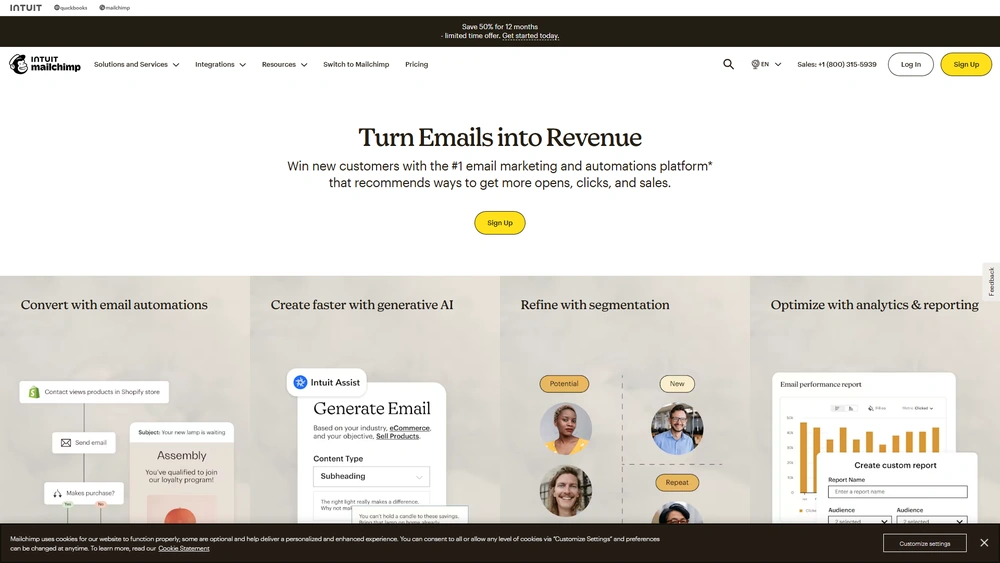Mailchimp Overview & 2026 Industry Position
Mailchimp, an all-in-one marketing platform best known for its email marketing legacy, has evolved into a full-scale customer engagement solution for small to midsize businesses (SMBs). Acquired by Intuit in 2021, Mailchimp has leveraged synergies with products like QuickBooks and TurboTax to create a powerful marketing-finance hybrid ecosystem. In 2026, it stands as a top-tier marketing automation platform designed to serve solopreneurs and scaling businesses alike.
With a user base exceeding 15 million, Mailchimp users now demand features that go far beyond newsletters: integrated social ads, journey builders, AI-driven insights, and ecommerce-specific tools. In 2026, Mailchimp remains at the forefront by doubling down on automation, omnichannel capabilities, and revenue intelligence—the ability to tie campaigns directly to income signals.
From Launch to 2026: Mailchimp’s Journey
Founded in 2001 by Ben Chestnut and Dan Kurzius, Mailchimp began as a side project offering email newsletters to small businesses. Notable changes since then:
- 2009: Freemium model launch propels user growth.
- 2014: Adds automation and basic segmentation.
- 2017: Begins expanding tools beyond email to holistic marketing.
- 2021: Acquired for $12B by Intuit, integrating with finance tools.
- 2022: Launches Customer Journey Builder and AI content optimizer.
- 2025: Emphasis on predictive analytics and ecommerce ROI tools.
2026 Strategy: Deepen AI-driven campaign optimization while strengthening integrations with financial and ecommerce platforms.

Mailchimp Key Features
Mailchimp’s modern toolbox extends far beyond email campaigns. Highlighted features include:
- Email Builder: Drag-and-drop creation with custom templates and AI content suggestions.
- Marketing Automation: Journey mapping, behavioral triggers, and automated follow-ups.
- Customer Segmentation: Real-time, predictive, and demographic-based segmentation logic.
- CRM Tools: Integrated contact profiles with purchase history, customer scorecards, and lifetime value indicators.
- AI Recommendations: “Send Time AI,” custom design assistant, and subject line optimizer.
- Social & Paid Ads: Direct publishing and analytics for Facebook, Instagram, and Google Ads.
- Commerce Features: Product recommendations, abandoned cart recovery, coupons, Shopify/Woo sync.
Workflow & UX
Mailchimp’s award-winning user interface continues to be polished for ease and intuitiveness. Whether you’re a beginner or experienced marketer, its guided flows minimize overwhelm and prioritize conversion.
- Navigation: Clear dashboard panes, with intuitive segmentation, campaign, and automation access.
- Campaign Setup: Step-by-step assistant walks through every stage.
- Visual Journey Builder: Drag-and-drop automation paths with live preview.
- Dark Mode + Mobile App: Supports on-the-go marketers with full mobile access.
Mailchimp Pricing Analysis & Value Metrics
Pricing as of July 2026 follows a tiered model, with flexible plans for solopreneurs to mid-sized agencies:
| Plan | Monthly Price | Audience Limit | Included Features |
|---|---|---|---|
| Free | $0 | 500 contacts | Email builder, basic CRM, forms, limited templates |
| Essentials | $13/month | 5,000 contacts | All Free features + A/B testing, custom branding, 24/7 email support |
| Standard | $20/month | 6,000 contacts | All Essentials features + journey builder, predictive segmentation, content optimizer |
| Premium | $350/month | 150,000 contacts | Advanced segmentation, multivariate testing, comparative reporting, phone support |
Value Verdict: Mailchimp remains competitively priced for its extensive feature set, though advanced users may outgrow affordability at the Premium tier.
Competitive Landscape
| Product | Strengths | Ideal For |
|---|---|---|
| MailerLite | Low-cost, user-friendly, clean builder | Startups & freelancers |
| ConvertKit | Creator-focused automation | Bloggers, YouTubers, content creators |
| ActiveCampaign | Highly robust automation and CRM | Businesses with sales focus |
| Brevo | Best value per contact at high volumes | Ecommerce marketers |
| Mailchimp Standard | Broad features + predictive AI | Growing SMBs and DTC brands |
Real-World Use Cases
- Ecommerce Integration: Sync with Shopify and WooCommerce for personalized product suggestions and revenue attribution in dashboards.
- Nonprofit Outreach: Use segmentation and donation triggers to optimize engagement.
- Freelancers: Build personal brand and capture leads without coding or site design.
- Local Services: Promote events and gather client reviews via email and SMS touchpoints.
Mailchimp Integrations
- Native Integrations: Shopify, Squarespace, Stripe, WooCommerce
- CRM Sync: Salesforce, Pipedrive, Hubspot
- Finance Tools: QuickBooks (full two-way sync with invoicing)
- Ad Platforms: Google Ads, Meta Ads, LinkedIn
- Zaps & APIs: 300+ no-code automations via Zapier, Make, and custom API endpoints
Pros & Cons
- Pros:
- Comprehensive all-in-one marketing suite
- World-class user interface and onboarding
- Best-in-class predictive AI tools
- Advanced segmentation and analytics at mid-tier pricing
- Deep integration with ecommerce and financial tools
- Cons:
- Costs accelerate quickly for scaling lists
- Advanced automation may require onboarding help
- Phone support only at Premium tier
Pro Tip: Use Mailchimp’s AI Subject Line (ASSL) Tester to improve open rates by 10–20% at scale—especially when combined with Send Time AI and pre-header personalization.
Final Thoughts
For SMBs, ecommerce stores, and content-driven businesses, Mailchimp remains a top-tier platform in 2026. It balances deep functionality with user-friendliness and offers best-in-class integrated analytics at non-enterprise pricing. However, those managing high-volume audiences will need to weigh pricing differences against tools like Brevo or ActiveCampaign.
Mailchimp FAQ
Yes. Since 2022, Mailchimp’s native Shopify app supports full sync for products, customers, and conversion tracking.
Mailchimp offers a Free plan for up to 500 contacts, including email builder, forms, and CRM basics—but lacks automation and detailed segmentation.
New additions include upgraded AI journey paths, deeper QuickBooks insights integration, and predictive ecommerce cart recovery push tools.
Yes, SMS marketing is available starting at the Standard plan and integrates with campaigns, reminders, and feedback loops.
Yes, users can build multilingual campaigns by duplicating flows or leveraging dynamic content blocks with language settings.

